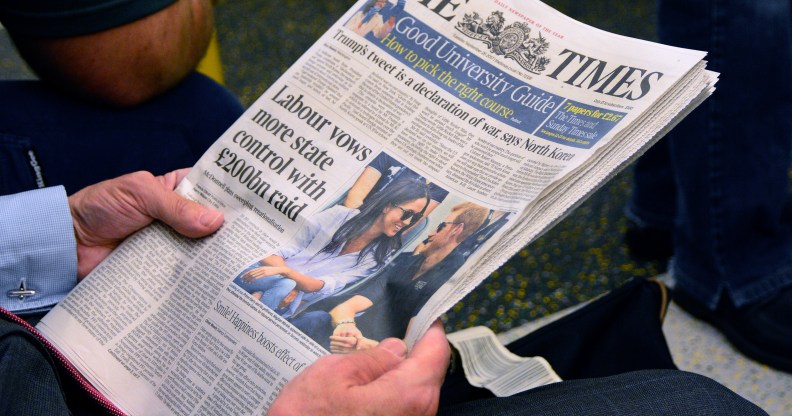Trans journalist speaks out after losing discrimination case against The Times

A man reads The Times newspaper as he rides the tube in London. (Robert Alexander/Getty)
The former night editor of The Times’ Scotland edition, who lost an anti-trans discrimination case against the paper, has told PinkNews she is “deeply disappointed” at the judgment.
Katherine O’Donnell, 54, was made redundant by The Times in January 2018 and took the paper to the Edinburgh employment tribunal, claiming anti-trans discrimination and unfair dismissal.
Judge Jane Porter dismissed O’Donnell’s claims in a judgment on August 20.
O’Donnell told PinkNews she has “grave concerns” that her case “has not been understood by the tribunal judge and panel members”.
“It’s too early to say if or on what grounds we will appeal,” she said.
“However, as all those who have been on this path before know, the road to justice and equality is long and with many setbacks.
“I remain determined to do all that I can to change for the better the way that trans people and other minorities are treated in the workplace – especially within and by media organisations.
“I had not allowed myself to have any expectation of winning, but I had had hopes that the case we made around the relationship between workplace culture within a media organisation and editorial output and agendas, while ground-breaking, had been understood.
“When your boss is also your editor and holds or promotes strong opinions and news stories that are factually flawed to the detriment of a minority to which you yourself belong, what do you do?
“I challenged The Times and The Sunday Times over the many and repeated inaccuracies and falsehoods in their coverage of trans-related issues… and here we are today.”
O’Donnell, who worked at the paper for 14 years, said at an earlier hearing that it had a “toxic environment for trans people”.
The Edinburgh employment tribunal heard that she claimed The Times had a sexist “boy’s club” newsroom culture that discriminates against transgender people.
Judge Porter rejected this claim, writing in her judgment that “the tribunal does not accept the evidence of a ‘boys club’ during the claimant’s employment… there was a significant number of senior women in powerful positions”.
Robin White, a barrister from Old Square chambers who represented O’Donnell, told PinkNews that “discrimination cases are never easy”.
“Gender-reassignment discrimination cases are the rarest of the nine categories of protected characteristics, but are on the increase.
“Tribunals (and society) have to learn about the differences between gender reassignment discrimination and other forms of discrimination just as they have done for the other protected characteristics,” White said.
A spokeswoman for The Times said: “We are pleased this judgment dismisses all the claims made by the claimant and confirms that The Times took reasonable and appropriate decisions and did not show any anti-transgender bias towards its staff.”
O’Donnell has 42 days to appeal the judgement.
The Times editor said trans coverage is ‘not biased’.
The Times’ editor John Witherow gave evidence to the Edinburgh employment tribunal on May 17 that The Times‘ coverage of transgender issues is “very sympathetic”.
John Witherow, 67, the current editor of the newspaper and one of the UK’s longest serving editors, rejected allegations that The Times‘ reporting of trans issues is imbalanced and adversarial to trans people.
When giving evidence, Witherow was shown a piece from The Times entitled “Children sacrificed to appease trans lobby”. When asked if he thought it was appropriate, Witherow said, “Yes, I think it backs up what she is saying.”
The writer of the piece, Janice Turner, won the 2018 British Journalism Awards prize for comment journalist of the year. Turner has been criticised in the past for her columns about trans rights.

